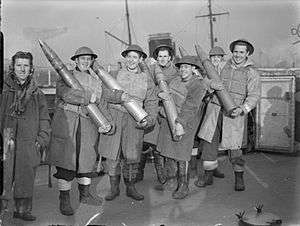QF 4 inch Mk XVI naval gun
| Ordnance QF 4 inch gun Mk XVI | |
|---|---|
|
Twin Mk XVI on HMCS Haida | |
| Type |
Naval gun Naval anti-aircraft gun |
| Place of origin |
|
| Service history | |
| In service | 1936-[1]-1950s |
| Used by |
Royal Navy Royal Canadian Navy Royal Australian Navy South African Navy |
| Wars |
World War II Korean War |
| Specifications | |
| Weight | Barrel & breech 4,495 lb (2,039 kg) |
| Barrel length | 180 inches (4,572 mm) (45 cal)) |
|
| |
| Shell |
Fixed QF 35 pounds (15.88 kg) HE 38.25 pounds (17.35 kg) S.A.P. |
| Calibre | 4-inch (101.6 mm) |
| Breech | vertical sliding block |
| Recoil | hydro - pneumatic 831 millimetres (33 in) |
| Elevation | mounting dependent (-10 to 80 deg on H.A. twin mark XIX mount)[2] |
| Traverse | mounting dependent |
| Rate of fire | 15–20 rounds per minute[3] |
| Muzzle velocity | 2,660 feet per second (811 m/s) |
| Maximum firing range |
19,850 yards (18,150 m) at 45 degrees elevation AA Range: 39,000 feet (11,890 m) at 80 degrees elevation[3] |
| Filling weight | 9 pounds (4.08 kg) |
The QF 4 inch Mk XVI gun[note 1] was the standard British Commonwealth naval anti-aircraft and dual-purpose gun of World War II.
Service

The Mk XVI superseded the earlier QF 4 inch Mk V naval gun on many Royal Naval ships during the late 1930s and early 1940s, increasing the high-explosive projectile weight from 31 pounds (14 kg) to 35 pounds (16 kg). These guns were usually mounted on HA/LA Mark XIX twin mountings, although several Australian frigates and corvettes had single-gun Mk XX mountings.
As secondary armament (list not complete):
- HMS Hood
- HMS Rodney
- HMS Barham, HMS Malaya, HMS Warspite
- Revenge-class battleships
- County-class cruisers
- HMS Exeter
- Swiftsure-class cruisers
- Crown Colony-class cruisers
- Edinburgh-class cruisers
- Southampton-class cruisers (Town-class)
- Arethusa-class cruisers
- Perth-class cruisers
- Leander-class cruisers
- HMS Effingham
- HMS Danae (ORP Conrad)
As main armament (list not complete):
- Aircraft carriers: HMS Furious, HMS Unicorn
- Escort carriers: Nairana-class escort carriers, HMS Pretoria Castle, HMS Activity
- C-class cruisers (converted to anti-aircraft cruisers)
- Abdiel-class minelayers
- Tribal-class destroyers
- L and M-class destroyer (the first series L: HMS Gorham, Lance, Legion, Lively)
- HMS Petard (modified)
- Weapon-class destroyers
- V and W-class destroyers (after WAIR modification - 15 ships)
- HMS Wallace (after WAIR modification)
- Hunt-class destroyers
- Some Bathurst-class corvettes (single-gun Mk XX mounting)
- Black Swan-class sloops
- Egret-class sloops
- Bittern-class sloop (modified)
- Grimsby-class sloop (modified)
- Bay-class frigates
- River-class frigates (part of Canadian-built)
- 8 auxiliary AA defence ships
- Some landing ships
Allied ships modified in the United Kingdom:
- ORP Błyskawica (Polish)
- HNLMS Jacob van Heemskerck (Dutch)
- HNLMS Isaac Sweers (Dutch)
- 4 French Elan-class avisos and Chamois-class avisos
The South African Navy Loch-class frigates (HMSAS Good Hope, HMSAS Natal and HMSAS Transvaal) each had two of these guns mounted on a twin Mark XIX on their foredeck between 1944 and 1976.
Ammunition
.jpg) Twin guns of HMAS Swan bombarding shore positions in New Guinea, February 1945
Twin guns of HMAS Swan bombarding shore positions in New Guinea, February 1945 Single Mk XX mounting on HMAS Barcoo, 1945
Single Mk XX mounting on HMAS Barcoo, 1945 Gunners of HMS Glasgow clearing empty cartridges after a shoot
Gunners of HMS Glasgow clearing empty cartridges after a shoot
Gunners of V-class destroyer HMS Vivien displaying anti-aircraft rounds, 1940 
A round in a fuze setter on HMS Belfast
See also
- QF 4 inch Mk V naval gun : Royal Navy anti-aircraft predecessor
- List of naval anti-aircraft guns
- List of naval guns
Surviving examples
- On HMCS Haida, Hamilton, Ortario, Canada.
- Naval Museum of Alberta, Canada
- On HMS Belfast, London.
- Explosion! Museum of Naval Firepower, Gosport, Hampshire, UK
- On ORP Błyskawica, Gdynia (re-bored to 100 mm).
- A pair at South African National Museum of Military History, Johannesburg
- A pair in a turret from INS Haifa (K-38), at Clandestine Immigration and Naval Museum, Haifa, Israel.
- Two single guns on HMAS Diamantina, Brisbane, Australia
- One twin gun at the Marinemuseet, Horten, Norway.
One twin gun in the Aldhurst military vehicles collection, Surrey England
Notes
- ↑ Mk XVI = Mark 16. Britain used Roman numerals to denote marks (models) of ordnance until after World War II. Mark XVI indicates this was the sixteenth model of QF 4 inch gun.
References
- ↑ "British 4"/45 (10.2 cm) QF HA Marks XVI, XVII, XVIII and XXI". NavWeaps. Retrieved 2008-08-25.
- ↑ "THE 4-in. Q.F. MARK XVI* GUNS ON THE H.A. TWIN MARK XIX MOUNTING.". maritime.org. Retrieved 2008-08-25.
External links
| Wikimedia Commons has media related to QF 4 inch Mk XVI naval gun. |
- B.R. 257. Handbook for the 4 inch Q.F. Mark XVI* Gun on the H.A. Twin Mark XIX And Single Mark XX Mountings. G3821/41 Naval Ordnance Department, Admiralty, July 1941.
- Tony DiGiulian, British 4"/45 (10.2 cm) QF HA Marks XVI, XVII, XVIII and XXI
- Youtube video clip of demonstration of loading and firing on HMS Belfast
- Youtube video clip of demonstration of loading and firing on HMS Belfast : closeup Note : for safety reasons, cartridges are seen being loaded without the normal attached shell.
